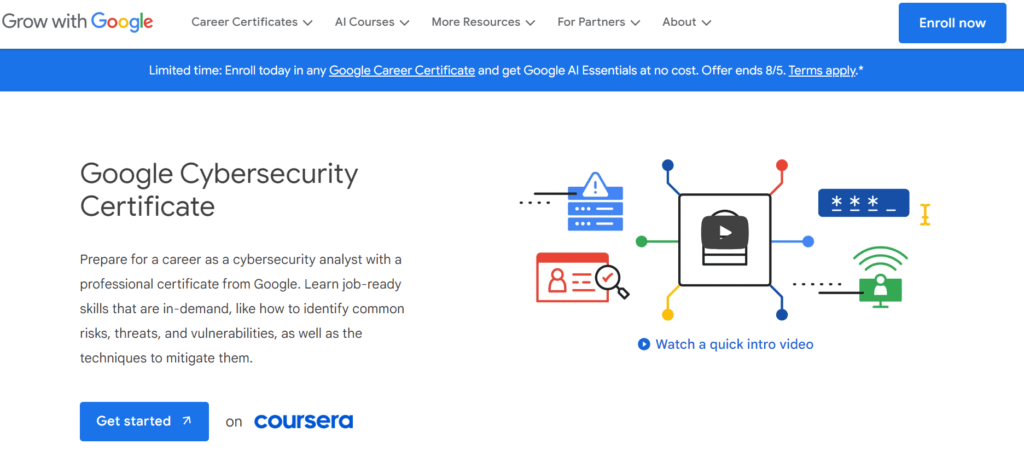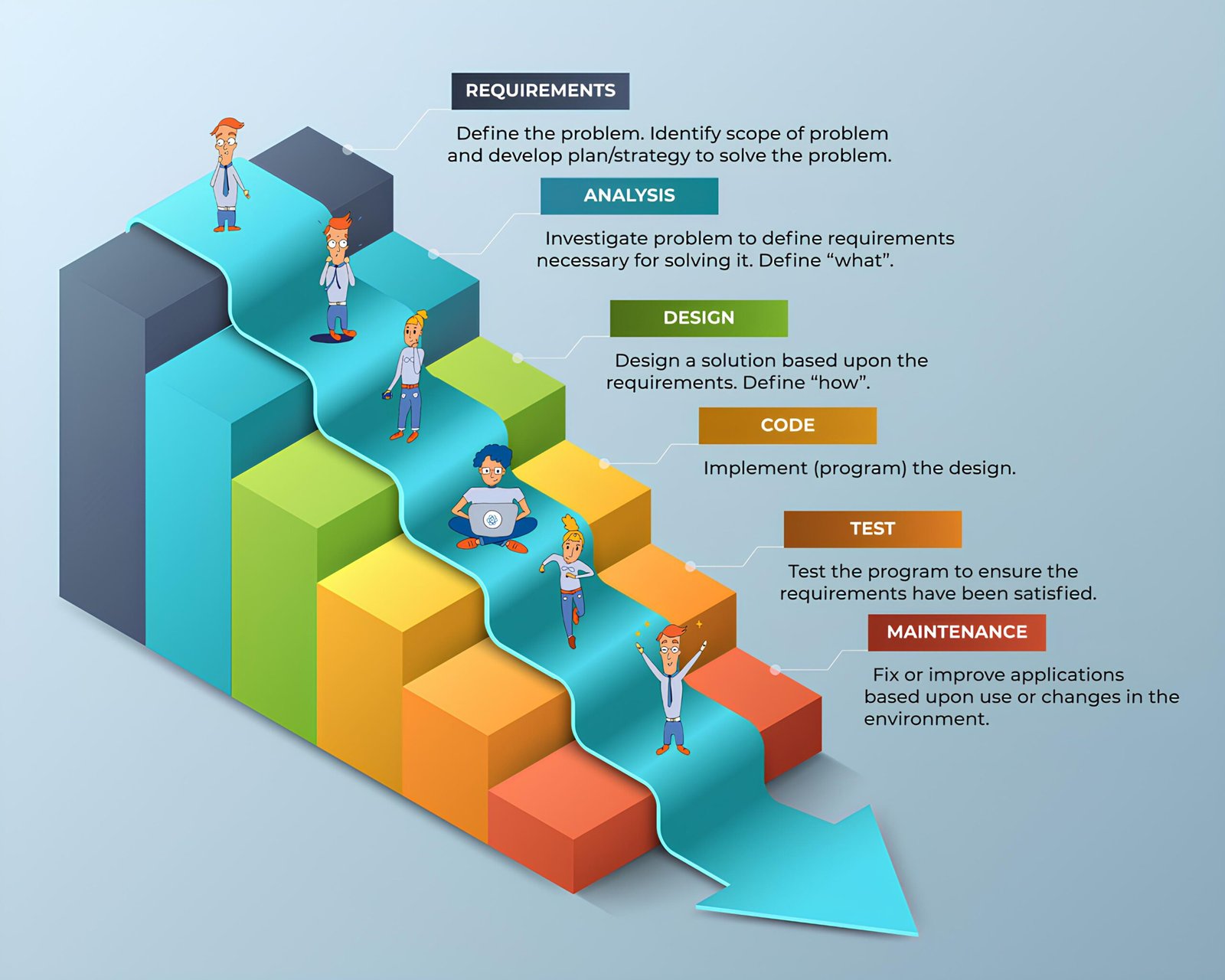Top Free Cybersecurity Courses to Boost Your Skills in 2024
Maaz Khalid
May 7, 2024

Cyber threats are constantly evolving, making cybersecurity skills a critical asset for professionals across various industries. With cyber-attacks becoming more sophisticated and frequent, investing in cybersecurity training has become a necessity. This is where free cybersecurity courses come into play, offering an accessible and cost-effective way to enhance your knowledge and stay ahead of potential risks.
Fortunately, there are numerous free cybersecurity courses available online, covering a wide range of topics from foundational concepts to advanced techniques. These cybersecurity courses are designed to equip individuals with the skills and knowledge needed to navigate the complex world of cybersecurity, whether you’re a beginner seeking an entry-level understanding or an experienced professional aiming to expand your expertise. In this article, we’ll explore some of the top free cybersecurity courses to help you boost your skills in 2024.
Importance of Cybersecurity
The importance of cybersecurity cannot be overstated. As technology continues to evolve and permeate every aspect of our lives, the risk of cyber threats has escalated significantly, making cybersecurity a crucial concern for individuals, businesses, and governments alike.
Growing Cyber Threats
The global cyber threat landscape is constantly evolving, with threat actors becoming increasingly sophisticated and persistent in their attacks. The number of cybersecurity incidents has risen dramatically, and their impact has become more severe. Organizations of all sizes and across various sectors are facing heightened risks, necessitating a proactive approach to cybersecurity.
Consequences of Cyber Attacks
Cyber attacks can have devastating consequences, ranging from financial losses and reputational damage to disruptions in critical services and infrastructure. The financial sector, in particular, is uniquely vulnerable due to the vast amounts of sensitive data and transactions it handles. A severe cyber incident in the financial sector could erode public confidence, disrupt critical services, and potentially lead to systemic shocks, threatening financial and economic stability.
Furthermore, the increasing reliance on third-party IT service providers and the emerging role of artificial intelligence (AI) in cybersecurity pose additional challenges. While these advancements offer operational resilience, they also expose organizations to potential system-wide shocks, as demonstrated by the 2023 ransomware attack that caused simultaneous outages at multiple US credit unions.
Need for Skilled Professionals
Addressing the growing cyber threats requires a skilled and knowledgeable workforce. However, the cybersecurity industry is facing a significant skills gap, with a shortage of professionals equipped to effectively combat evolving cyber threats. This gap poses a risk not only to individual organizations but also to the global cyber infrastructure.
To bridge this gap, educational institutions are expanding their cybersecurity curricula, offering specialized degrees and certifications designed to equip students with the latest knowledge and skills in cyber defense. Additionally, professional development and continuous learning have become integral parts of a cybersecurity career, with organizations and industry bodies offering various training programs, workshops, and seminars to help current professionals stay abreast of the latest trends, tools, and techniques.
Free Cybersecurity Resources
Individuals and organizations have access to a wealth of free cybersecurity resources that can help them enhance their skills and knowledge. These resources range from online courses and tutorials to virtual labs and simulations, as well as open-source tools and platforms.
Online Courses and Tutorials
One of the most accessible and convenient ways to learn about cybersecurity is through online courses and tutorials. Many reputable organizations offer free cybersecurity training to combat the shortage of skilled professionals and increase diversity in the field. For instance, YouTube hosts a vast collection of educational content, including videos from cybersecurity experts and industry-leading companies.
Platforms like Coursera and edX also provide free access to audit courses from prestigious universities, allowing learners to gain knowledge from world-renowned instructors. Additionally, the SANS Institute, a leading provider of cybersecurity training, offers a wide range of free resources, including workshops, tools, webcasts, and research materials.
Virtual Labs and Simulations
Hands-on experience is crucial in the field of cybersecurity, and virtual labs and simulations provide a safe and controlled environment for learners to practice their skills. These platforms offer simulated environments where users can experiment with different techniques, test their abilities, and make mistakes without real-world consequences.
Network simulation labs, for example, allow users to design, test, and analyze various network configurations, helping them understand core routing and switching principles. Cybersecurity fundamental labs, on the other hand, focus on developing essential skills such as working with Linux, writing scripts, and understanding core cybersecurity concepts.
Platforms like OverTheWire, Blue Team Labs, and CyberDefenders offer interactive challenges and investigations that cover a wide range of topics, from system hardening and network defense to digital forensics and incident response.
Open-Source Tools and Resources
The open-source community has contributed significantly to the field of cybersecurity by developing a vast array of free tools and resources. These tools are created through collaborative and transparent efforts, making them accessible alternatives to proprietary software.
Open-source tools like Authelia, BLint, Cloud Active Defense, and Damn Vulnerable RESTaurant provide solutions for authentication, binary analysis, cloud security, and secure coding practices, respectively. Other tools like Fail2Ban, Grafana, and Graylog focus on log management, visualization, and analysis, which are essential for detecting and responding to cyber threats.
Tools like LSA Whisperer, Mantis, and OWASP dep-scan assist with authentication package analysis, asset discovery, and dependency vulnerability scanning, respectively. These open-source tools empower individuals and organizations to enhance their cybersecurity posture without incurring significant costs.
By leveraging these free cybersecurity resources, individuals can acquire fundamental knowledge, develop practical skills, and stay up-to-date with the latest trends and techniques in the ever-evolving field of cybersecurity.
Top Free Cybersecurity Courses

Course Descriptions and Highlights
Google Cybersecurity Professional Certificate is a comprehensive program designed to equip learners with essential cybersecurity skills. Offered by Google, this course covers a wide range of topics, including network security, Python programming, Linux, cloud computing, algorithms, auditing, computer programming, computer security incident management, cryptography, databases, leadership and management, network architecture, and risk management. With a 4.8-star rating and over 30,000 reviews, this beginner-level professional certificate can be completed in 3 to 6 months.
EC-Council‘s Essentials Series is a cybersecurity workforce development initiative aimed at tackling the skills shortage crisis. This free 3-course series offers baseline knowledge certifications in ethical hacking, digital forensics, and network security, making cybersecurity learning and training accessible to all. The series includes the following courses:
- Ethical Hacking Essentials (E|HE)
- Digital Forensics Essentials (D|FE)
- Network Defense Essentials (N|DE)
Each course comes with an optional hands-on lab upgrade, allowing learners to gain practical experience in a simulated environment.
Learning Objectives and Syllabus
Ethical Hacking Essentials (E|HE)
- 12 learning modules
- Official eCourseware
- 15+ hours of premium, self-paced video training
- 11 lab activities in a simulated lab environment (optional add-on)
- Course modules cover information security fundamentals, ethical hacking fundamentals, threats and vulnerabilities, password cracking techniques, social engineering, network-level attacks, web application attacks, wireless attacks, mobile attacks, IoT and OT attacks, cloud computing threats, and penetration testing fundamentals.
- Tools covered: L0phtCrack, Netcraft, SQL Injection Detection Tool, Web Application Security Scanner, and ARP Spoofing Detection Tools.
Network Defense Essentials (N|DE)
- 12 learning modules
- Official eCourseware
- 14+ hours of premium, self-paced video training
- 11 lab activities in a simulated lab environment (optional add-on)
- Course modules cover network security fundamentals, identification, authentication, and authorization, network security controls (administrative, physical, and technical), virtualization and cloud computing, wireless network security, mobile device security, IoT device security, cryptography and PKI, data security, and network traffic monitoring.
- Tools covered: Docker Bench for security, AWS, Miradore MDM, HashCalc, MD5 calculator, HashMyFiles, VeraCrypt, Data Recovery Wizard, and Wireshark.
Digital Forensics Essentials (D|FE)
- 12 learning modules
- Official eCourseware
- 11+ hours of premium, self-paced video training
- 11 lab activities in a simulated lab environment (optional add-on)
- Course modules cover computer forensics fundamentals, investigation process, hard disks and file systems, data acquisition and duplication, defeating anti-forensics techniques, Windows forensics, Linux and Mac forensics, network forensics, investigating web attacks, dark web forensics, investigating email crime, and malware forensics.
- Tools covered: Linux, Windows, Sleuth Kit, Wireshark, Splunk, TOR browser, and ESEDatabaseView.
Certification Opportunities
Upon completing the EC-Council Essentials Series courses, learners have the opportunity to obtain a Certificate of Achievement by passing a multiple-choice exam through the ECC Exam Center. The certification is course-specific, with separate certifications available for N|DE, E|HE, and D|FE.
Expected Results;
Cybersecurity threats are becoming increasingly sophisticated. It’s imperative for individuals and organizations to prioritize cybersecurity skills development to safeguard themselves against potential attacks. The free cybersecurity courses discussed in this article offer a valuable opportunity to enhance your knowledge and stay ahead of emerging threats without incurring significant costs.
While these Cybersecurity courses provide a solid foundation, continuous learning, and practical experience are essential in the ever-changing cybersecurity field. Stay vigilant, explore additional resources, and consider pursuing professional certifications to further validate your skills. By embracing a proactive approach to cybersecurity education, you can contribute to a safer digital landscape for all.
Subscribe to our newsletter to receive future updates on Technology, Artificial Intelligence (AI), and Tech Trends. Explore our categories to find more relevant stuff. Stay informed and motivated with our most recent insights!


